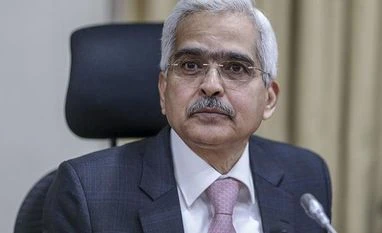Reserve Bank Governor Shaktikanta Das on Wednesday underlined the need for a big push to infrastructure investment, education and digital economy to achieve sustainable growth and generate jobs in smaller cities.
"As we recover (from the pandemic), we must deal with the legacies of the crisis and create conditions for strong, inclusive and sustainable growth. Limiting the damage that the crisis inflicted was just the first step; our endeavour should be to ensure durable and sustainable growth in the post-pandemic future," Das said.
The governor made these comments while speaking at the 48th AIMA National Management Convention through video conferencing.
Sustainable growth, Das said, should entail building on macro fundamentals via medium-term investments, sound financial systems and structural reforms.
"Towards this objective, a big push to investment in healthcare, education, innovation, physical and digital infrastructure will be required. We should also continue with further reforms in labour and product markets to encourage competition and dynamism, and to benefit from the pandemic induced opportunities," he said.
In addition, the warehouse and supply-chain infrastructure will be critical to bolstering value addition and productivity in the agriculture and horticulture sector, Das said, adding this will create employment opportunities in semi-urban and rural areas and promote inclusive growth.
The production linked incentive (PLI) scheme announced recently by the government for certain sectors was an important initiative to boost the manufacturing sector, he said, adding the gains were likely to be durable and not a one-off.
Also Read
Noting that the pandemic has affected the poor and the vulnerable more in emerging and developing countries, Das said, "Our endeavour should be to ensure livable and sustainable growth in the post-pandemic future. Restoring the durability of private consumption, which has remained historically the mainstay of aggregate demand will be very crucial going forward".
More importantly, sustainable growth should entail meeting on macro fundamentals via medium-term investments, sound financial systems and structural reforms, he added.
Needless to add that inclusive growth in the post-pandemic world will require cooperation and participation of all stakeholders, Das said, adding collaborative effort of various stakeholders is helping accomplish a seemingly difficult task of accelerating the pace of vaccination.
Observing that a major challenge to inclusiveness in the post-pandemic world would come from the fillip to automation provided by the pandemic itself, he said greater automation would lead to overall productivity gain, but it may also lead to slack in the labour market. Such a scenario calls for significant skilling/training of our workforce".
There is a need to guard against any emergence of the digital divide, as digitisation gains speed after the pandemic, he noted.
Emphasising sustainable growth, the governor said a transition towards a greener future will remain critical.
"The need for clean and efficient energy systems, disaster-resilient infrastructure, and environmental sustainability cannot be overemphasised. Due consideration should be given to individual country roadmaps, keeping in mind country-specific features and their stage of development while adopting policies towards climate resilience," he said.
Touching upon India's competitiveness, Das said there is a growing league of unicorns in India, reflecting its potential for technology-led growth.
The country has added several unicorns over the last year to become the third-largest startup ecosystem in the world.
Besides, he said, India's digital momentum is expected to continue with strong demand in areas such as cloud computing, customer troubleshooting, data analytics, workplace transformation, supply chain automation, 5G modernisation and cyber security capabilities.
E-commerce is emerging as another promising sector, which has benefited from the growing market, increased internet and smartphone penetration and COVID-induced shifts in consumer preferences.
Various initiatives taken by the government, namely Digital India, Make in India, Start-up India, Skill India and Innovation Fund have created a conducive eco-system for faster growth in the digital sector, he said.
Noting that the pharmaceutical sector has huge potential, he said this was demonstrated during the pandemic by the development of vaccines.
The presence of global players will help in enhancing India's share in the global value chain (GVC) and building up a resilient supply chain network. Greater GVC participation would also enhance the competitiveness of India's large and micro, small and medium enterprise (MSME) supplier base, he said.
In the post-pandemic period, global trade will remain vital for faster recovery, he said, adding India's exports have rebounded, with a broad-based double-digit growth during the first half of 2021-22.
To further strengthen the export potential, there is a need to enhance the share of high-tech engineering exports to achieve an ambitious engineering export target of USD 200 billion by 2030, Das said.
Emphasising that a dynamic and resilient financial system is at the root of a stronger economy, he said India's financial system has transformed rapidly to support the growing needs of the economy.
While banks have been the primary channels of credit in the economy, recent trends suggest an increasing role of non-bank funding channels, he noted.
(Only the headline and picture of this report may have been reworked by the Business Standard staff; the rest of the content is auto-generated from a syndicated feed.)
)